Teaching Scenario-Based Planning for Sustainable Landscape Development: An Evaluation of Learning Effects in the Cagliari Studio Workshop
Abstract
:1. Introduction
- Do short and intensive educational planning workshops advance participating students’ planning understanding, defined here as knowledge of the design and procedures of scenario-based planning processes?
- Do educational planning workshops contribute to the development of relevant planning skills among participating students?
2. Methods
2.1. Case Study Workshop Approach and Methods
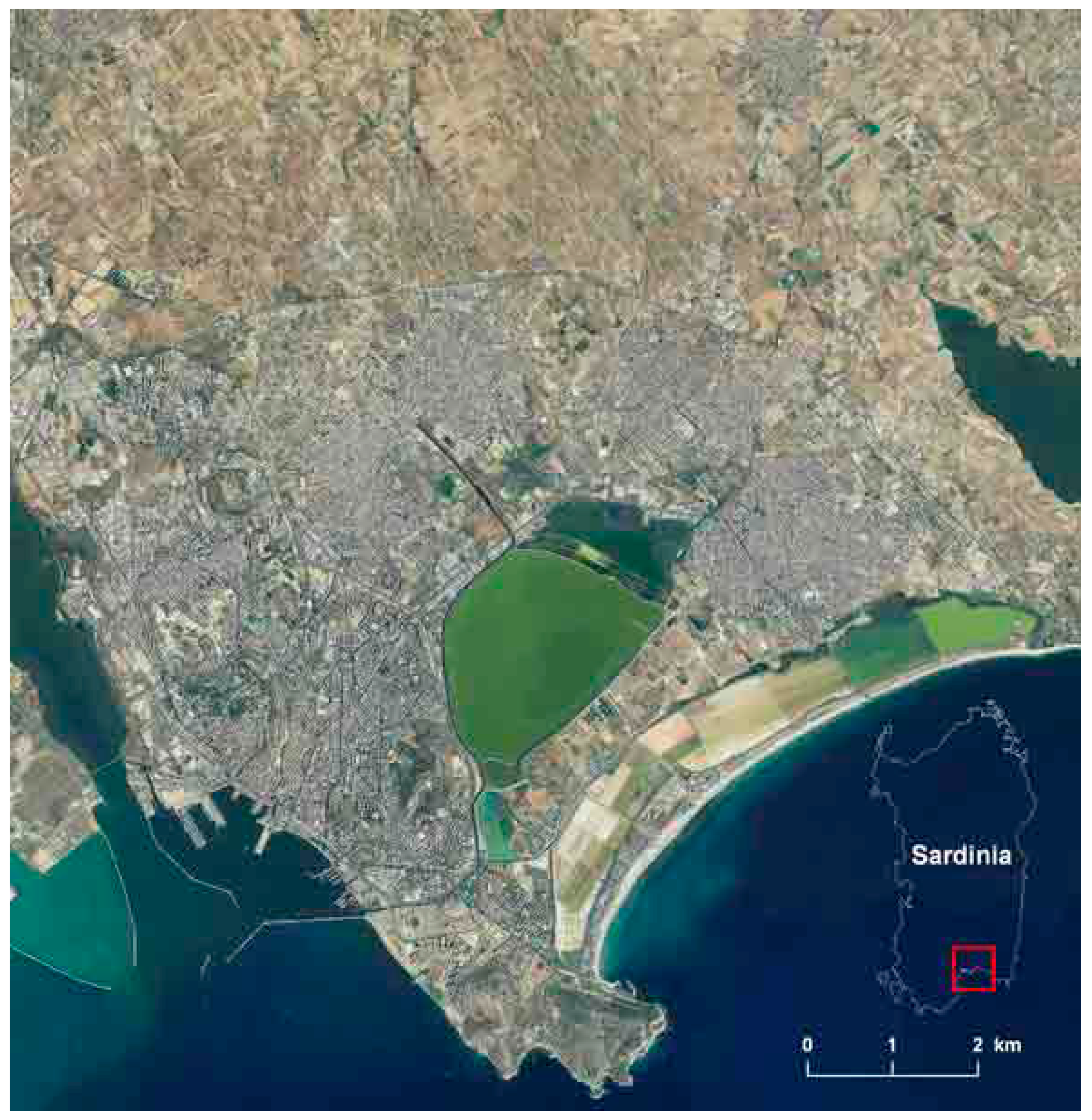
- How should the landscape be described?
- How does the landscape operate?
- Is the current landscape working well?
- How might the landscape be altered?
- What difference might the changes cause?
- How should the landscape be changed?
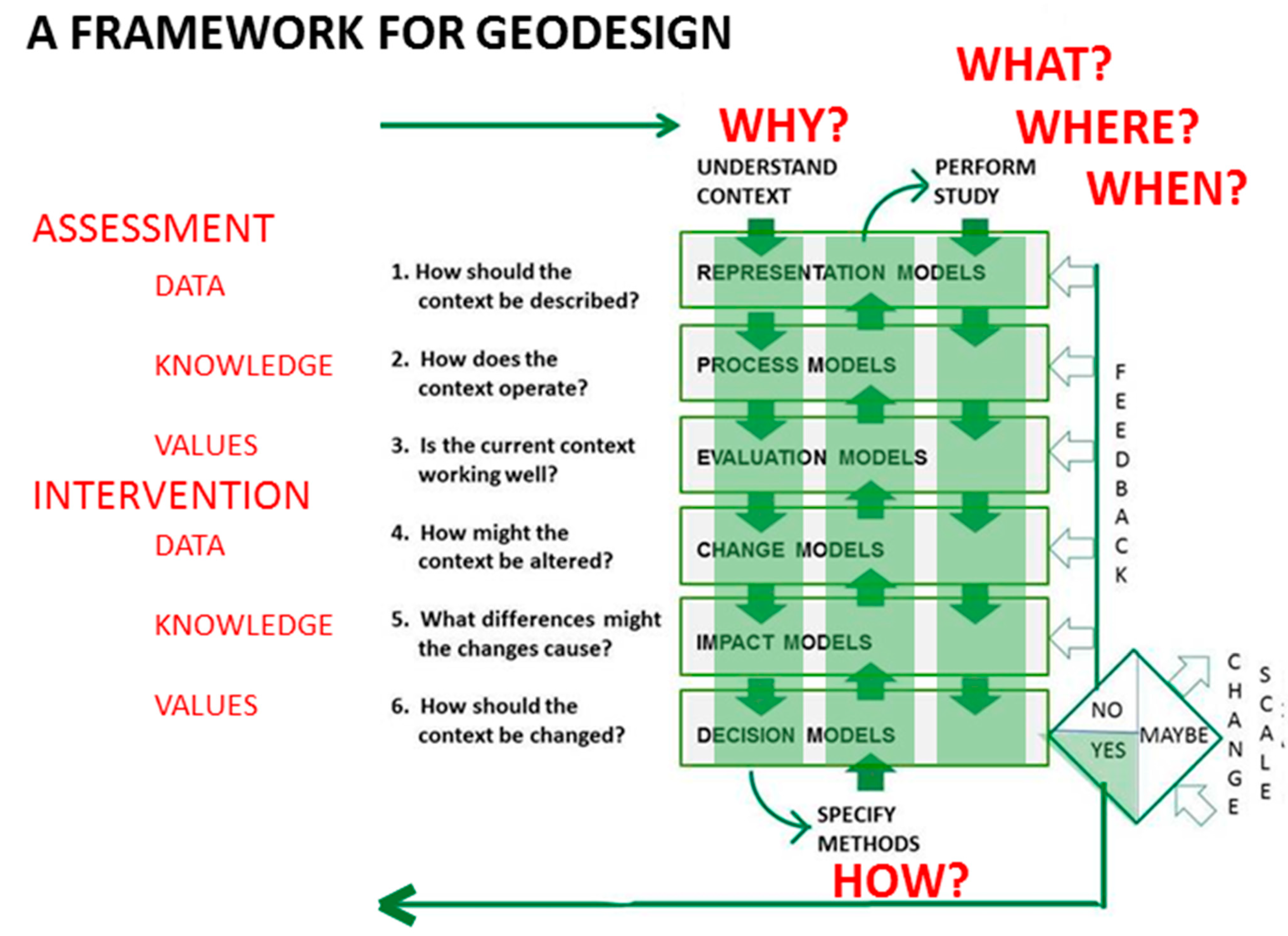

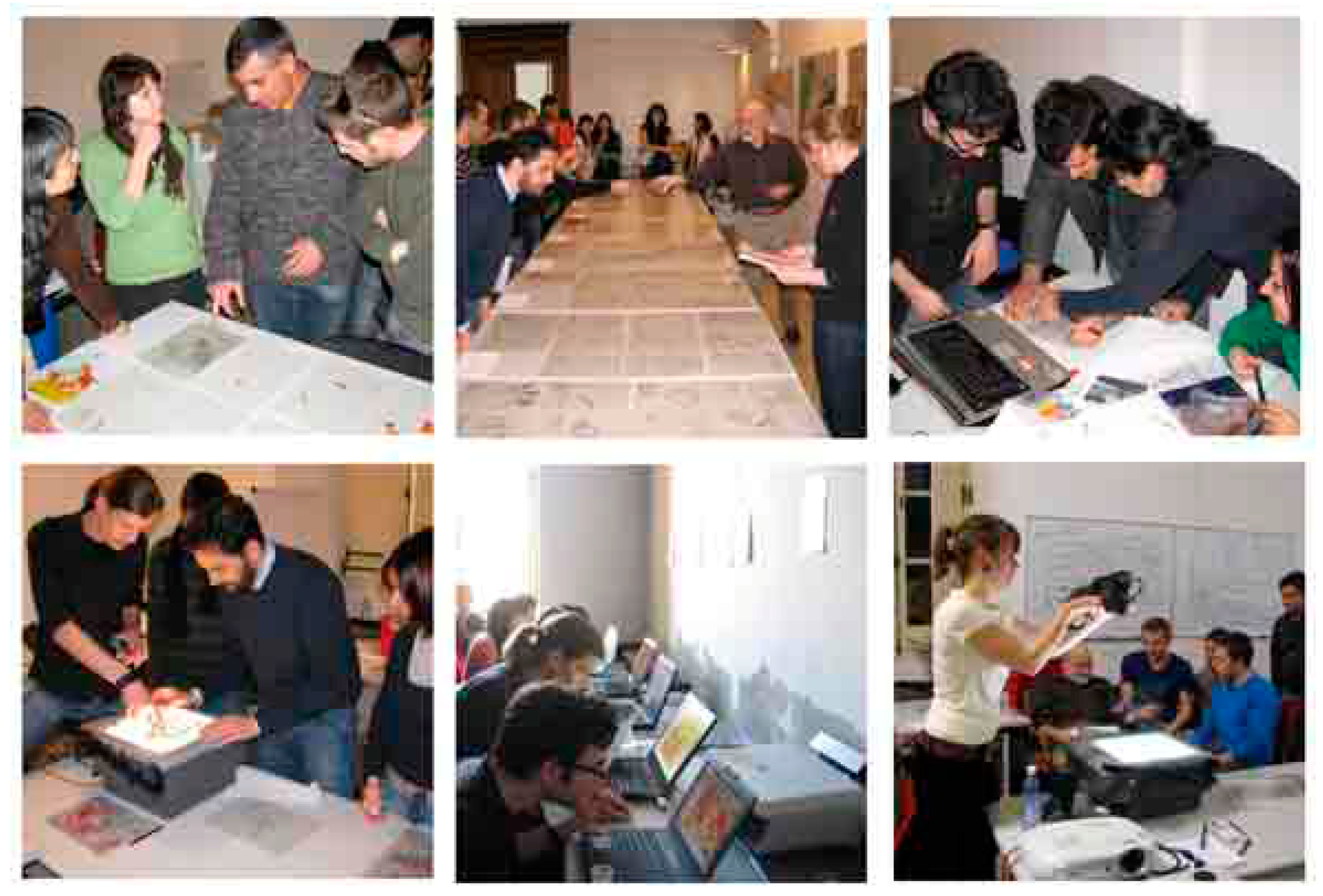
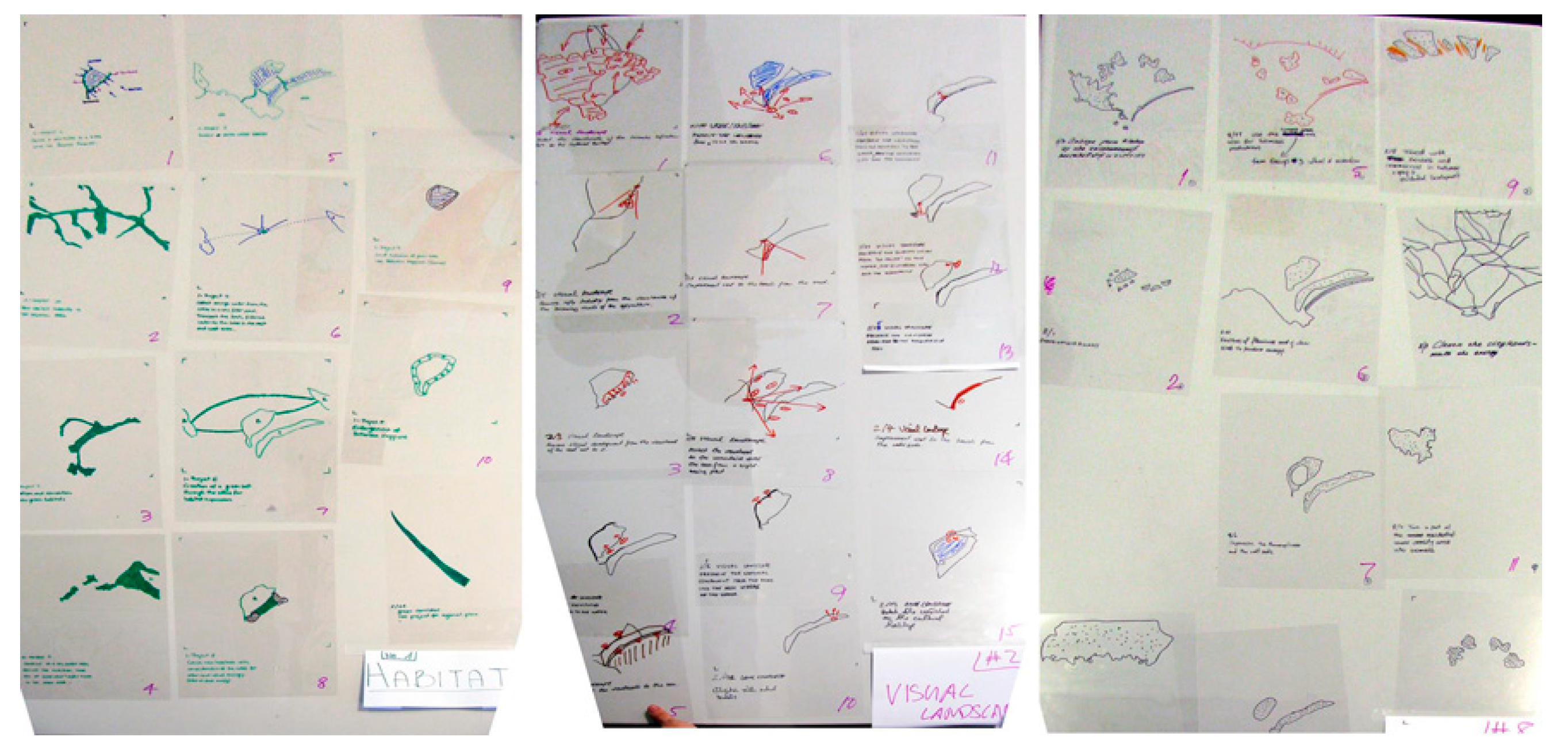
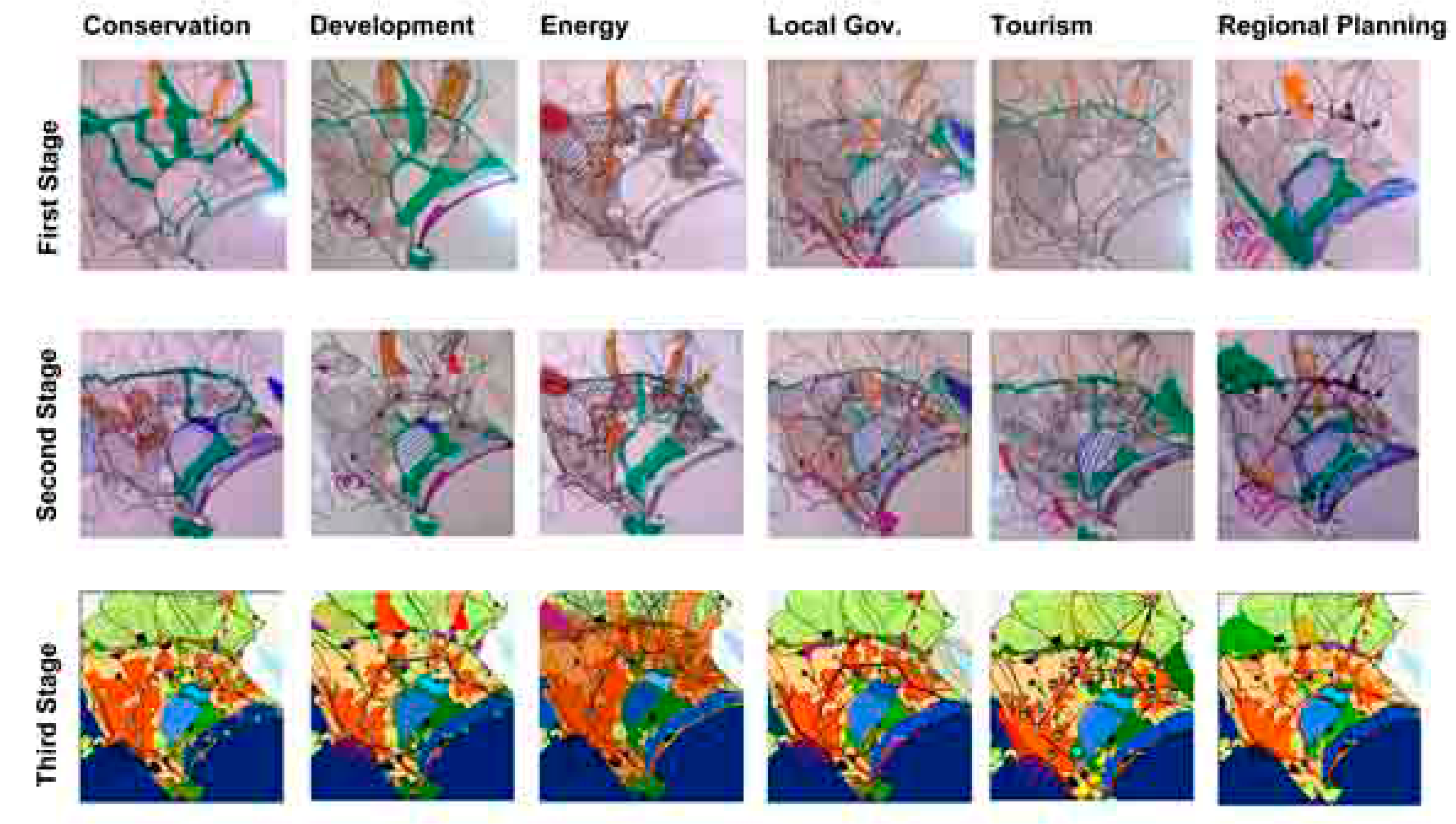

2.2. Evaluation Data Gathering Procedures
2.3. Evaluation Data Analysis
3. Evaluation Results
3.1. Workshop Effects on Participants’ Planning Understanding
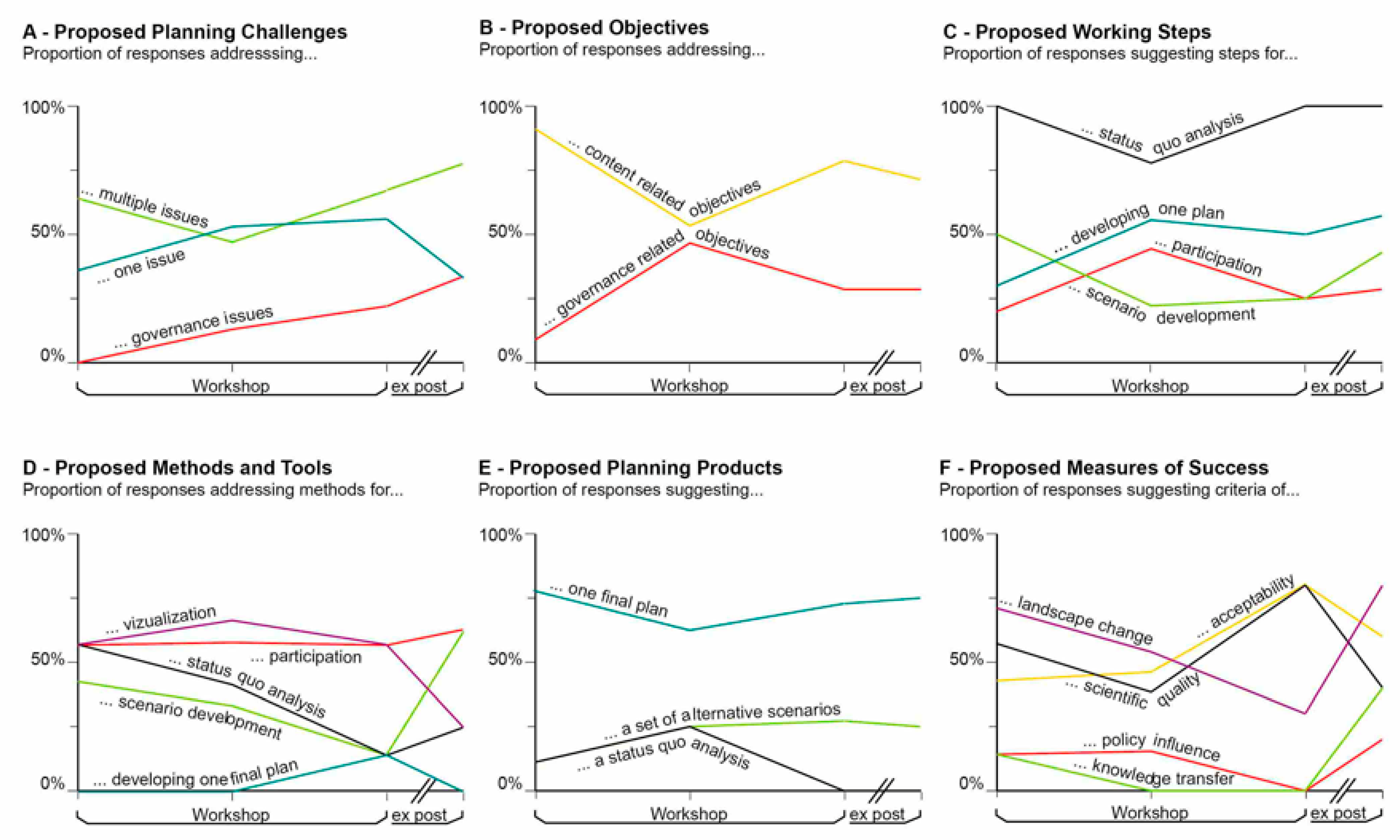
3.2. Workshop Contributions to Participants’ Acquisition of Planning Skills
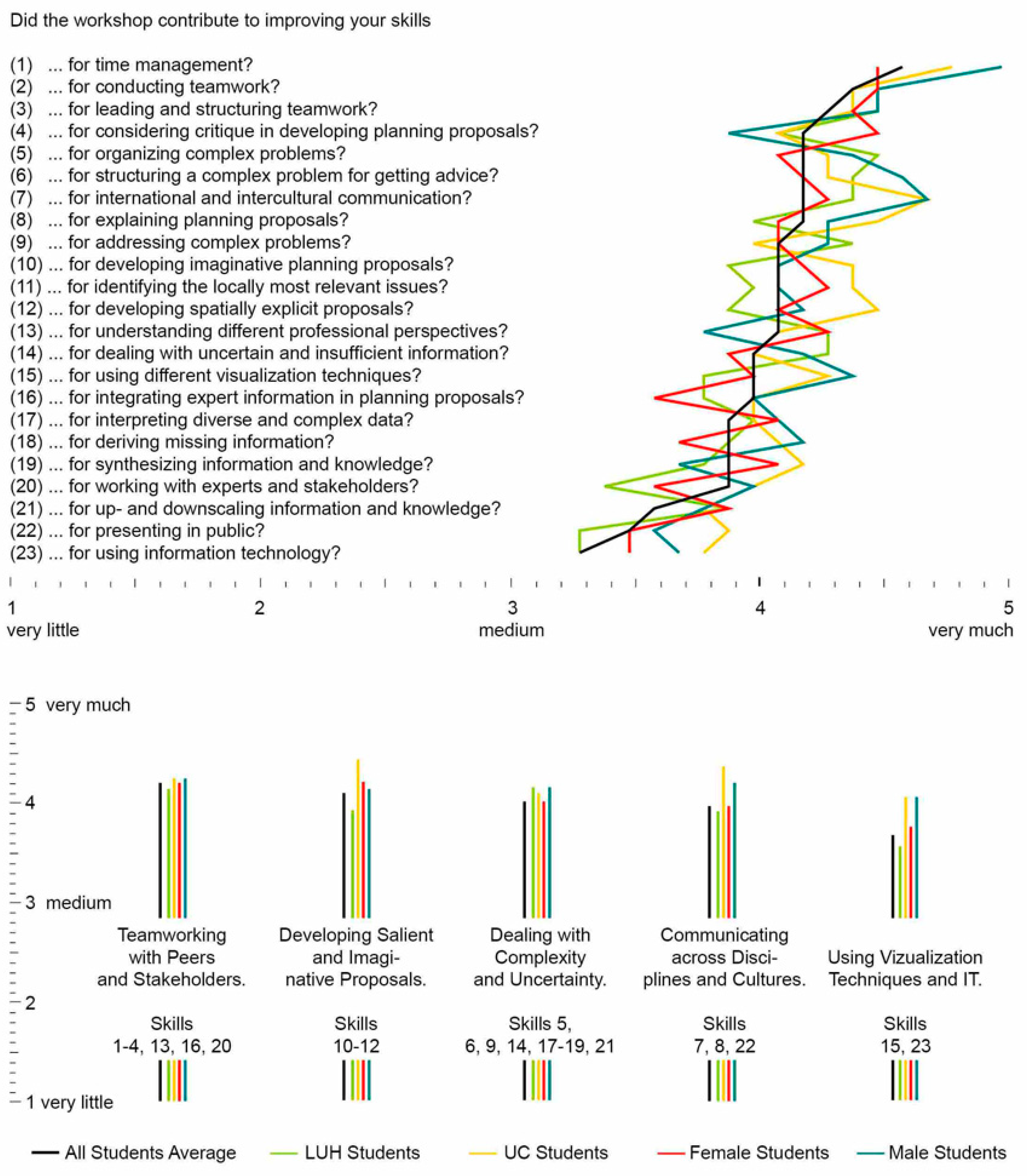
4. Discussion and Conclusions
- Many decisions about the scope of the workshop planning problem, the methods and expected outputs were pre-defined by the faculty. This one the one hand limited students’ freedom to define their procedures (compared with a semester-long studio), but minimized time needed for orientation and enabled an immediate start of the planning process.
- All interim results, ideas, and planning proposals of student teams were publicly presented and made available for use by other groups (e.g., the long table of change proposals). This limited the personal attachment of students to “their” particular ideas and facilitated collaborative planning and more objective searches for appropriate solutions.
- Student groups were always mixed by disciplinary background and nationality. This made teamwork more difficult but also enhanced mutual understanding and facilitated practicing communication skills and intercultural collaboration.
- Student team composition and focus was changed from process and evaluation themes to different stakeholder interests after the mid-workshop presentation. This procedure had the benefit that stakeholder interest teams included members knowledgeable about different landscape processes who now served as quasi-experts on their theme. Also, students further enhanced teamwork skills in being required to again adjust to a new group setting.
- The time provided for working periods was strictly limited. This, on the one hand, led to a relative crudeness of initial diagrams. On the other hand, it fostered concise thinking, facilitated rapid development and concretization of ideas and allowed for iterative improvement and intertwined collaboration between student groups. The time limitations of presentations to only two minutes also fostered conciseness and thoughtful preparation.
- Rotating the obligation to present interim results between students enhanced individual skills for public speaking.
- General “time-outs” for addressing questions in public enabled joint learning across all student groups and the possibility to build-upon each other’s works.
- Providing examples and templates for expected products in each planning step seemed to enhance understanding of the workshop process among students. As suggested by student reporting, the use of pre-determined color code schemes for drawing process models, change diagrams and projects, for completing evaluations and land use maps was essential to allow for mutual understanding, quick presentations, and joint learning.
Acknowledgments
Author Contributions
Conflicts of Interest
References
- Hulse, D.W.; Branscomb, A.; Payne, S.G. Envisioning Alternatives: Using Citizen Guidance to Map Future Land and Water Use. Ecol. Appl. 2004, 14, 325–341. [Google Scholar] [CrossRef]
- Steinitz, C.; Arias, H.; Bassett, S.; Flaxman, M.; Goode, M.; Maddock, T.; David, M.; Peiser, R.; Shearer, A. Alternative Futures for Changing Landscapes: The Upper San Pedro River Basin in Arizona and Sonora; Island Press: Washington, DC, USA, 2003; p. 202. [Google Scholar]
- Carpenter, S.R.; Pingali, P.; Bennett, E.; Zurek, M. (Eds.) Ecosystems and Human Well-Being: Scenarios; Island Press: Oxford, UK, 2005; Volume 2.
- Steinitz, C. A Framework for Theory Applicable to the Education of Landscape Architects (and Other Environmental Design Professionals). Landsc. J. 1990, 9, 136–143. [Google Scholar]
- Shearer, A.W. Approaching scenario-based studies: Three perceptions about the future and consiederations for landscape planning. Environ. Plan. B 2005, 32, 67–87. [Google Scholar] [CrossRef]
- Xiang, W.N.; Clarke, K.C. The use of scenarios in land-use planning. Environ. Plan. B Plan. Des. 2003, 30, 885–909. [Google Scholar] [CrossRef]
- Alcamo, J. Environmental Futures: The Practice of Environmental Scenario Analysis (Developments in Integrated Environmental Assessment); Jakeman, A.J., Ed.; Elsevier: Amsterdam, The Netherlands, 2008; Volume 2. [Google Scholar]
- Albert, C.; Zimmermann, T.; Knieling, J.; von Haaren, C. Social learning can benefit decision-making in landscape planning: Gartow case study on climate change adaptation, Elbe valley biosphere reserve. Landsc. Urban Plan. 2012, 105, 347–360. [Google Scholar] [CrossRef]
- Antrop, M.; Rogge, E. Evaluation of the process of integration in a transdisciplinary landscape study in the Pajottenland (Flanders, Belgium). Landsc. Urban Plan. 2006, 77, 382–392. [Google Scholar] [CrossRef]
- Luz, F. Participatory landscape ecology—A basis for acceptance and implementation. Landsc. Urban Plan. 2000, 50, 157–166. [Google Scholar] [CrossRef]
- Selman, P. Community participation in the planning and management of cultural landscapes. J. Environ. Plan. Manag. 2004, 47, 365–392. [Google Scholar] [CrossRef]
- Shearer, K.S.; Xiang, W.N. Representing multiple voices in landscape planning: A land suitability assessment study for a park land-banking program in Concord, North Carolina, USA. Landsc. Urban Plan. 2009, 93, 111–122. [Google Scholar] [CrossRef]
- Brundiers, K.; Wiek, A.; Redman, C.L. Real-world learning opportunities in sustainability: From classroom into the real world. Int. J. Sustain. High. Educ. 2010, 11, 308–324. [Google Scholar]
- Selman, P.H. Planning at the Landscape Scale; Routledge: London, UK, 2006. [Google Scholar]
- Albert, C.; Moreno, J.C.V. Planning-Based Approaches for Supporting Sustainable Landscape Development. Landsc. Online 2010, 19, 1–9. [Google Scholar] [CrossRef]
- Krätzig, S.; Warren-Kretzschmar, B. Using Interactive Web Tools in Environmental Planning to Improve Communication about Sustainable Development. Sustainability 2014, 6, 236–250. [Google Scholar] [CrossRef]
- Vakil, A.; Marans, R.W.; Feldt, A. Integrative Planning Workshops: The Michigan Experience. J. Plan. Educ. Res. 1990, 10, 61–69. [Google Scholar] [CrossRef]
- Lusk, P.; Kantrowitz, M. Teaching Students to Become Effective Planners through Communication: A Planning Communications Studio. J. Plan. Educ. Res. 1990, 10, 55–59. [Google Scholar] [CrossRef]
- Frank, A.I. Three Decades of Thought on Planning Education. J. Plan. Lit. 2006, 21, 15–67. [Google Scholar] [CrossRef]
- Lang, J. Teaching Planning to City Planning Students. An Argument for the Studio/Workshop Approach. J. Plan. Educ. Res. 1983, 2, 122–129. [Google Scholar] [CrossRef]
- Agouridas, V.; Race, P. Enhancing Knowledge Management in Design Education Through Systematic Reflection Practice. Concurr. Eng. 2007, 15, 63–76. [Google Scholar] [CrossRef]
- Brown, R.D.; Hallett, M.E.; Stoltz, R.R. Student learning styles in landscape architecture education. Landsc. Urban Plan. 1994, 30, 151–157. [Google Scholar] [CrossRef]
- Kvan, T.; Jia, Y. Students’ learning styles and their correlation with performance in architectural design studio. Des. Stud. 2005, 26, 19–34. [Google Scholar] [CrossRef]
- Roberts, A. Cognitive styles and student progression in architectural design education. Des. Stud. 2006, 27, 167–181. [Google Scholar] [CrossRef]
- Lehmann, M.; Christensen, P.; Du, X.; Thrane, M. Problem-oriented and project-based learning (POPBL) as an innovative learning strategy for sustainable development in engineering education. Eur. J. Eng. Educ. 2008, 33, 283–295. [Google Scholar] [CrossRef]
- Grant, J.; Manuel, P. Using a Peer Resource Learning Model in Planning Education. J. Plan. Educ. Res. 1995, 15, 51–57. [Google Scholar] [CrossRef]
- Stoltz, R.R.; Brown, R.D. The application of a pedagogical framework to the design of university courses. Landsc. Urban Plan. 1994, 30, 159–168. [Google Scholar] [CrossRef]
- Wiek, A.; Withycombe, L.; Redman, C. Key competencies in sustainability: A reference framework for academic program development. Sustain. Sci. 2011, 6, 203–218. [Google Scholar] [CrossRef]
- Wiek, A.; Xiong, A.; Brundiers, K.; van der Leeuw, S. Integrating problem—And project-based learning into sustainability programs. Int. J. Sustain. High. Educ. 2014, 15, 431–449. [Google Scholar] [CrossRef]
- Rieckmann, M. Future-oriented higher education: Which key competencies should be fostered through university teaching and learning? Futures 2012, 44, 127–135. [Google Scholar] [CrossRef]
- Foley, R.W.; Petrucci, D.; Wiek, A. Imagining the Future City. Issues Sci. Technol. 2014, XXXI, 80–90. [Google Scholar]
- Steinitz, C. World conference on education for landscape planning. Landsc. Urban Plan. 1986, 13, 329–332. [Google Scholar] [CrossRef]
- Linke, H. Landscape planning education in European socialist countries. Landsc. Urban Plan. 1986, 13, 359–366. [Google Scholar] [CrossRef]
- Kiemstedt, H. The education of landscape architects and planners in West. Germany and Western Europe: Development, present situation and perspectives. Landsc. Urban Plan. 1986, 13, 379–387. [Google Scholar] [CrossRef]
- Steinitz, C.; Abis, E.; von Haaren, C.; Albert, C.; Kempa, D.; Palmas, C.; Pili, S.; Vargas-Moreno, J.C. Alternative Futures for the Metropolitan Area of Cagliari—The Cagliari Workshop, an Experiment in Interdisciplinary Education; Gangemi Editore: Rome, Italy, 2010. [Google Scholar]
- Steinitz, C. A Framework for Geodesign: Changing Geography by Design; ESRI Press: Redlands, CA, USA, 2012. [Google Scholar]
- Scholz, R.W.; Tietje, O. Embedded Case Study Methods: Integrating Quantitative and Qualitative Knowledge; Sage Publications: New York, NY, USA, 2001. [Google Scholar]
- Yin, R.K. Case Study Research: Design and Methods, 3rd ed.; Sage Publication Inc.: Thousand Oaks, CA, USA, 2013. [Google Scholar]
- Hancock, D.R. Doing Case Study Research; Teachers College Press: New York, NY, USA, 2014. [Google Scholar]
- Barbour, R. Introducing Qualitative Research. A Student’s Guide to the Craft of Doing Qualitative Research; Sage Publications Ltd.: Thousand Oaks, CA, USA, 2008. [Google Scholar]
- Hay, I. (Ed.) Qualitative Research Methods in Human Geography, 2nd ed.; Oxford University Press: New York, NY, USA, 2005.
- Merriam, S.B. Qualitative Research: A Guide to Design and Implementation; John Wiley & Sons: Manhattan, NY, USA, 2014. [Google Scholar]
- Jick, T.D. Mixing qualitative and quantitative methods: Triangulation in action. Adm. Sci. Q. 1979, 24, 602–611. [Google Scholar] [CrossRef]
- McMillan, J.H.; Schumacher, S. (Eds.) Research in Education: Evidence-Based Inquiry; Pearson Higher: London, UK, 2014.
- Lewis, J.L.; Sheppard, S.R.J. Culture and communication: Can. landscape visualization improve forest management consultation with indigenous communities? Landsc. Urban Plan. 2006, 77, 291–313. [Google Scholar] [CrossRef]
- Schroth, O.; Lange, E.; Sheppard, S.R.J.; Schmid, W.A.; Hayek, U.W. Multiple-Case Study of Landscape Visualizations as a Tool in Transdisciplinary Planning Workshops. Landsc. J. 2011, 30, 53–71. [Google Scholar] [CrossRef]
© 2015 by the authors; licensee MDPI, Basel, Switzerland. This article is an open access article distributed under the terms and conditions of the Creative Commons Attribution license (http://creativecommons.org/licenses/by/4.0/).
Share and Cite
Albert, C.; Von Haaren, C.; Vargas-Moreno, J.C.; Steinitz, C. Teaching Scenario-Based Planning for Sustainable Landscape Development: An Evaluation of Learning Effects in the Cagliari Studio Workshop. Sustainability 2015, 7, 6872-6892. https://doi.org/10.3390/su7066872
Albert C, Von Haaren C, Vargas-Moreno JC, Steinitz C. Teaching Scenario-Based Planning for Sustainable Landscape Development: An Evaluation of Learning Effects in the Cagliari Studio Workshop. Sustainability. 2015; 7(6):6872-6892. https://doi.org/10.3390/su7066872
Chicago/Turabian StyleAlbert, Christian, Christina Von Haaren, Juan Carlos Vargas-Moreno, and Carl Steinitz. 2015. "Teaching Scenario-Based Planning for Sustainable Landscape Development: An Evaluation of Learning Effects in the Cagliari Studio Workshop" Sustainability 7, no. 6: 6872-6892. https://doi.org/10.3390/su7066872
APA StyleAlbert, C., Von Haaren, C., Vargas-Moreno, J. C., & Steinitz, C. (2015). Teaching Scenario-Based Planning for Sustainable Landscape Development: An Evaluation of Learning Effects in the Cagliari Studio Workshop. Sustainability, 7(6), 6872-6892. https://doi.org/10.3390/su7066872





